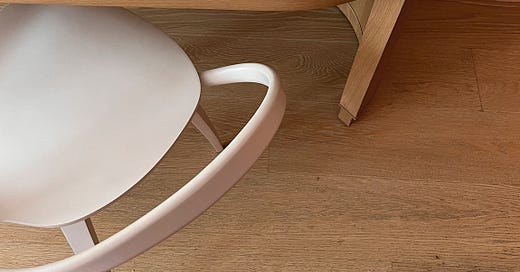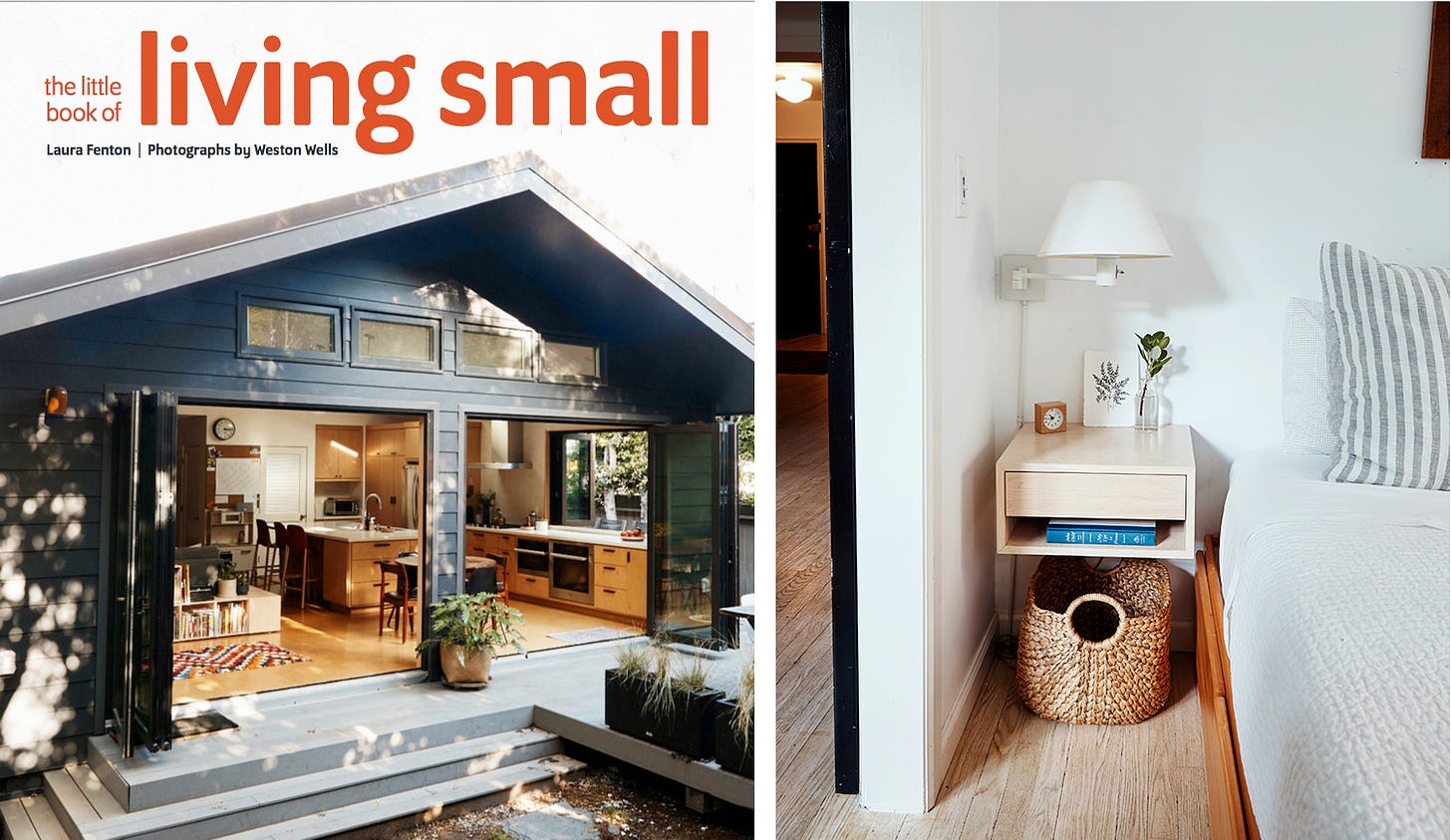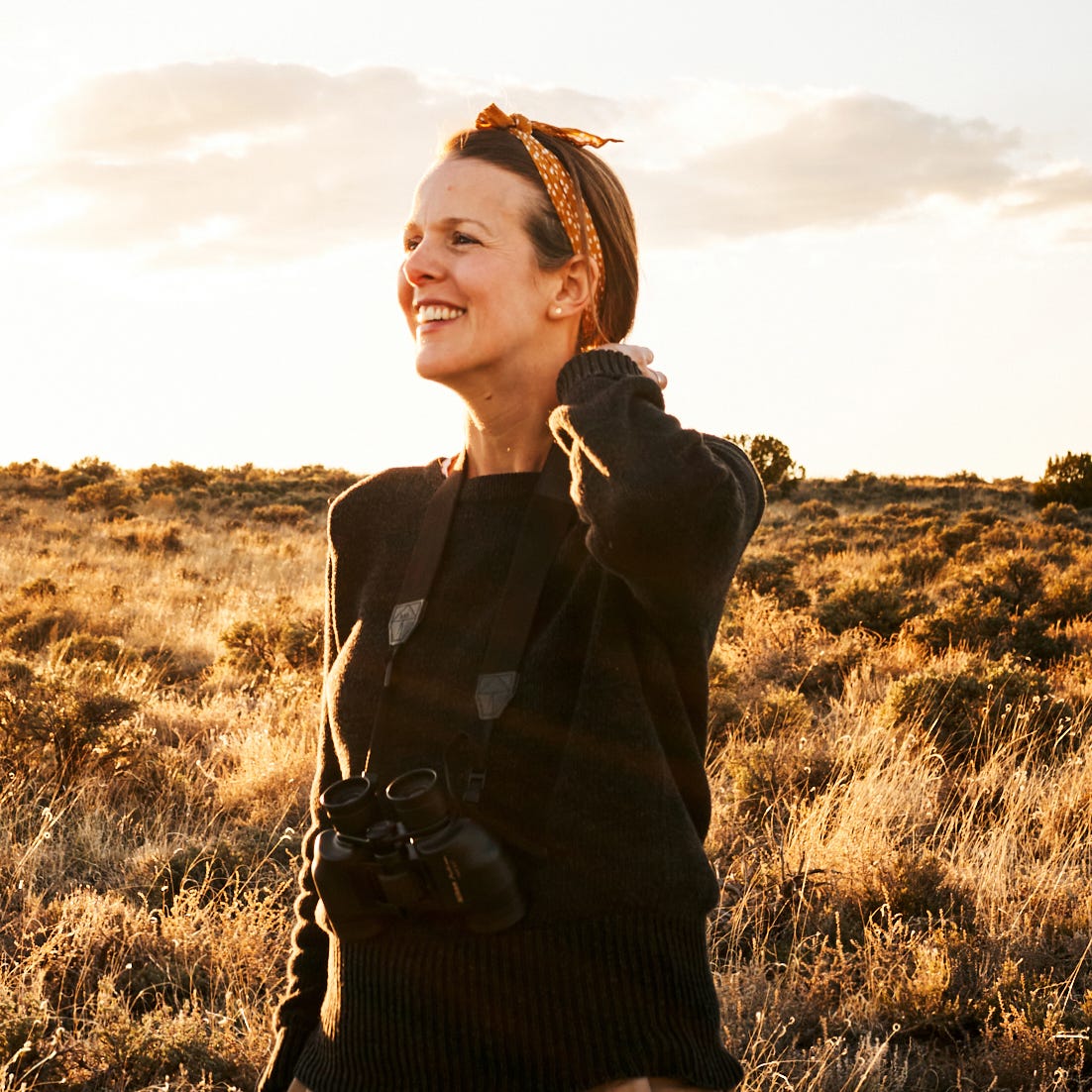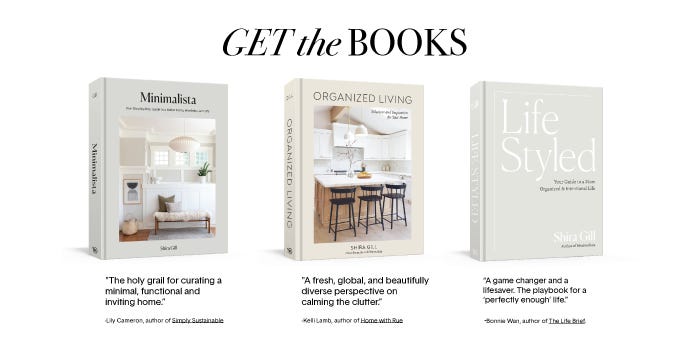Laura Fenton is a brilliant journalist, Substacker, and author who I met early on in my career when she interviewed me for a Parents Magazine feature. We connected instantly over our shared interest in sustainability, minimalism, and tiny homes, and I'm happy to now call her a dear friend.
Laura is a small-space and sustainable living expert based in New York City, where she lives in a small apartment with her husband and son. When Laura casually told me that she no longer has an Amazon account and seldom (if ever) shops online I had to know more.
I'll be the first to admit: as someone who champions minimalism, I've still struggled to break free from Amazon's mighty grip. The frictionless convenience it offers to my perpetually busy life has been hard to resist. One-click ordering and same-day delivery can feel like necessities when juggling work, family, and everything in between. That's why I was so intrigued (and inspired) by Laura's complete Amazon breakup—and knew I had to share her insights with all of you.
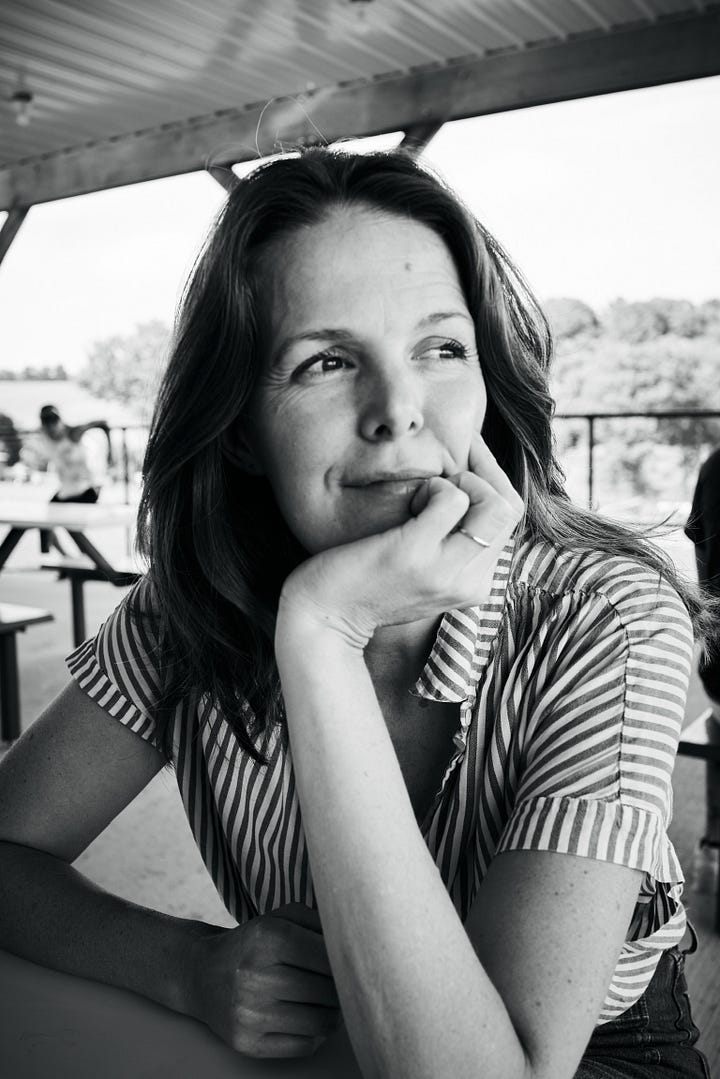
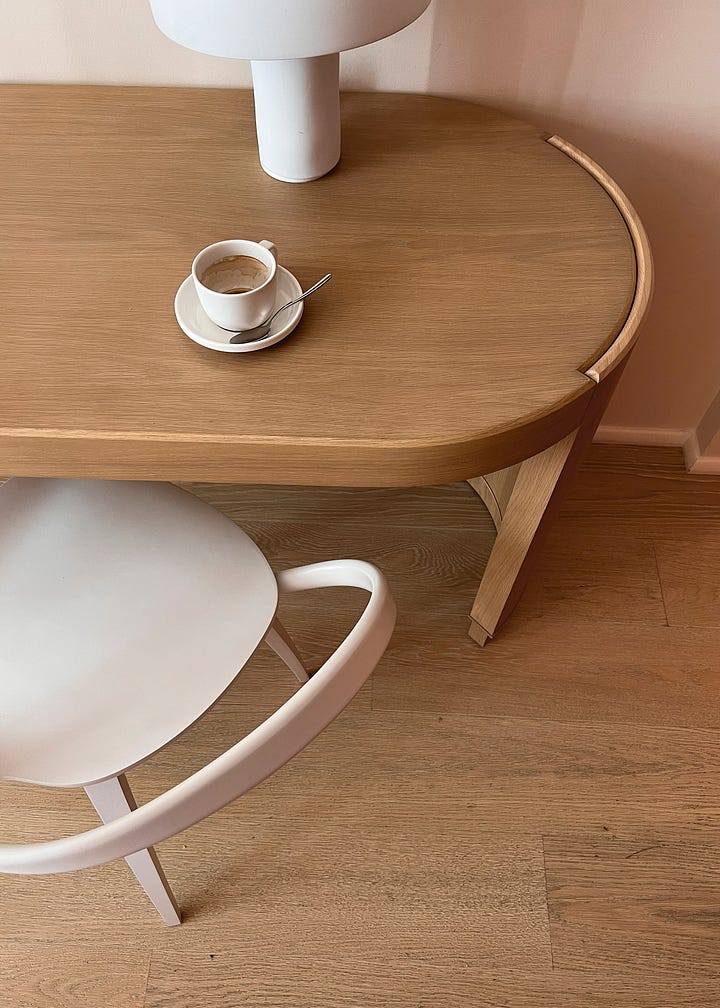
How is a breakup with Amazon aligned with your living small philosophy?
For me it was initially about sustainability: I decided to quit shopping on Amazon at the end of 2019 to better align where I spend my money with my values surrounding the climate crisis. This was right after the global climate strikes, which included Amazon workers who had walked out in protest of the company's inaction on the climate crisis. I also wanted to do it because I realized having fast, "free" shipping at my disposal was enabling a lot of unnecessary purchases.
Since then though, my motivations have broadened. I deeply value having a thriving community of businesses in my neighborhood. If I want them to stay, I need to shop there.
For those who want to reduce Amazon purchasing but not necessarily fully break up what would you suggest as an easy first step?
Take a pause before you buy. I used to say, 'try the 24-hour rule,' but I've changed my tune and now believe in waiting 48 hours before any purchase–yes, any purchase. If you see something you think you need, bookmark it. Then wait two full days to see how you feel. Chances are the "need" might be less pressing than you think. The secret to not shopping on Amazon is just to not buy the thing in the first place.
How can we stop or reduce panic purchasing?
Just don't do it! Most of the time what we "need" in a hurry is not truly necessary. Instead of buying a last-minute gift on Amazon, why not buy a gift certificate to the nearest bookstore or bakery? If there's a school supply that's demanded in an unreasonable time frame, let the teacher know you need more notice, or if your big kid forgot to tell you, maybe this is a learning experience for them? There is almost no household supply that you cannot live without for a day or two.
Any suggestions for Amazon alternatives that are still quite easy and budget friendly?
Amazon sells so many things that there's no single answer, but I always try to shop secondhand first because it's a way to save money, reduce waste, and shop locally. I literally buy everything but bathing suits and underwear used. Large thrift stores have household goods, craft supplies, and all manner of things you might normally buy on Amazon.
I also use my Buy Nothing Group to ask to borrow random things I need, like gesso for an art project or a particular tool. People are genuinely so happy to lend things that you might otherwise buy.
What unexpected benefits have you discovered since stepping away from Amazon?
I buy less stuff, but that is expected. Less expected might be the joy and satisfaction I take in shopping locally. I like buying things at the weird little art store or my neighborhood hardware store: It's an excuse to get out of the house (I work from home) and I might run into a neighbor on the way. I also love knowing my money is staying right here in my community and not going to far away shareholders and billionaires.
How has reducing your Amazon usage influenced your overall spending habits and lifestyle?
Trying to shop locally and secondhand has vastly reduced how much I buy. It's also reduced how much time I spend thinking about a purchase. Whenever I shop online I tend to spend way too much time comparing different items and shipping prices. In my experience, there's a real drawback to the endless options.
Can you share any community resources or support systems that helped you make the change?
You could get an Amazon-avoiding buddy and text each other for accountability and problem solving for things you can't find easily. When I quit Amazon I actually took notes about what I was tempted to buy and why, so that I could reflect on it. I also highly recommend unfollowing influencers or unsubscribing from email lists that inspire you to shop.
What are your strategies for balancing the fear of missing out on deals with a conscious buying approach?
Shira, I think it was you who shared the wisdom that the thing you don't buy is 100-percent cheaper than whatever you do buy. People often get hung-up on the low prices they perceive Amazon to offer, but I find they don't always have the lowest price and a few dollars here and there will not break my budget. I only worry about getting a deal on big-ticket items that are going to seriously impact my family's budget.
How do you transition from Amazon's convenience to building a more mindful, localized shopping routine?
I think wanting to quit Amazon alone isn't that motivating. You'll be much more likely to succeed if you imagine what you want instead: A sense of community, a schedule that leaves time for a trip to the hardware store, the brainspace to remember what you need before it's a five-alarm fire. Maybe you want to live in a world that treats workers with dignity and pays a living wage? Once you have a picture of all that, I think it's a lot easier to quit shopping on Amazon.
In addition to reducing your online shopping (and consuming in general) any other ways your family has found to live more sustainably?
We never order food for delivery. I prefer to leave the house and eat in a restaurant–with no packaging waste.
What are some of your green cleaning MVP's?
Bon Ami, which has been around since the Civil War. It's a readily-available, non-toxic scouring powder that's a little more powerful than baking soda and not as harsh as something like Comet.
What are some simple swaps you have made at home to reduce plastic and packaging waste?
I buy whole heads of lettuce–they taste better and keep fresh longer than those awful clamshells of "mixed greens" that rot the minute you turn your back.
What's the real reason you live small?
I choose to live small because I'd rather spend on and save for other things. Every time we think of moving we ask, "Would we be happier in a bigger apartment?" And so far, the answer has always been no.
A life hack you swear by?
8 hours of sleep does wonders for just about everything.
Most used app on your phone?
According to my phone, my most-used are super boring: Messages, Waze, Mail, but my most useful app (even if it doesn't get used for the most minutes) is Libby.
Digital or physical planner?
Digital calendar, paper to-do lists.
How do you fuel your creativity?
Reading
How do you recharge when its all too much?
I like to get outside, preferably into the kind of nature where you feel far away from it all.
What is something you are obsessed with right now?
I’m obsessed with all the different ways gardeners can help the planet—with native plants, conserving water, and creating habit. This might be my next book!
What questions do you suggest people ask themselves before making a purchase?
I think there are three really helpful questions to ask yourself:
First, "Do I have time to buy this in-person?" If you're able-bodied and active, taking that twenty-minute trip to your local hardware store or pharmacy doesn't just get you what you need—it strengthens your community and makes your life richer by getting you out of the house and connecting with your neighborhood.
Second, "Can I reduce the shipments?" Instead of ordering staples one at a time, consider buying a year's worth in one order. Even in my storage-challenged apartment, I keep a year's supply of face soap and backup toothpaste, and it takes up less than a square foot of space.
And finally, "Would my grandparent have bought this?" Most items in today's online carts would be unrecognizable to someone born in the early 1900s. If our grandparents got by without these things, what did they do instead? Did they make, mend, or do without? We live in a time of such abundance that this perspective can be really grounding.
_
I want to thank Laura for sharing her wisdom and practical approach to more mindful consumption. Her mindset reminds us that our small daily choices accumulate into significant impact, both for our personal wellbeing and the planet we share.
If you found this conversation valuable, I highly encourage you to subscribe to Laura's Substack, "Living Small," where she regularly shares insights on sustainable living.
As we celebrate Earth Day this week, I'd love to hear from you: What's one small step you're taking (or plan to take) to reduce your environmental footprint? Maybe it's a break from Amazon, embracing secondhand shopping, or simply being more intentional about what you bring into your home. Share in the comments below—your ideas might inspire our entire community.
Enneagram Rabbit Hole: I've totally fallen down the enneagram rabbit hole (turns out I'm a 7 with an 8 wing). It's been such a game-changer for understanding why I do what I do and why others might see the world differently. After devouring basically every book on the subject, I treated myself to a session with enneagram expert Ali Dunn who helped me connect some major dots in the most clarifying way possible. If you're curious about your own type (and trust me, it's fascinating), check out more right here.
New Feature: Signs You've Taken Decluttering Too Far — and What to Do Instead was published on Pop Sugar - Read it Here
Listen Up: Thrilled to learn that my Edit, Then Elevate episode on The Minimalist Moms podcast is among the most listened to of all time!
Earth Day Giveaway! My favorite local, eco-friendly brand Botnia is giving away a clean skincare bundle to one lucky person. Head over to my Instagram to enter!
Work With Me 1:1: No-fluff strategy and support to help you tackle your large and small goals. Get support here
Get Organized Master Class: Learn how to edit, organize, and elevate your home like a pro. To the course
Curated Product Recs: My fewer better faves for your home, life, and wardrobe. To the recs
Get the Books: Actionable strategies to clear clutter, get organized, & elevate your home and life. To the books
Order LifeStyled now from your favorite bookshop! bookshop | target | amazon | barnes and noble | signed copies - now available in the UK, Australia, and New Zealand


